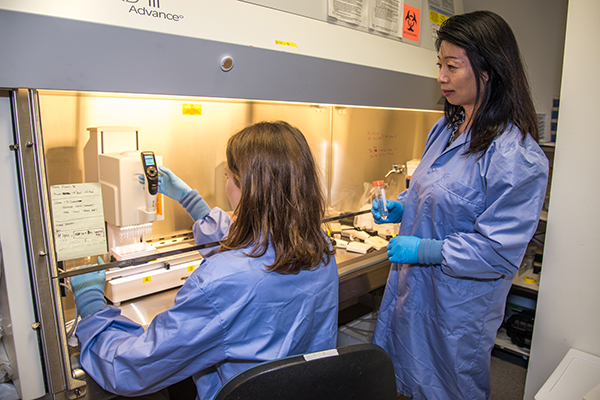Groundbreaking USF College of Public Health research pushing the fight against malaria forward

A microscopic look at Plasmodium falciparum, the deadliest malaria parasite in existence. The parasite is the small, dark-colored structure inside the cells.
For the first time ever, an international team of researchers led by scientists at the University of South Florida have identified the core repertoire of essential genes of the world’s deadliest parasite – an innovative breakthrough with lifesaving potential.
Researchers at USF Health’s College of Public Health have identified the essential genes of the human malaria parasite Plasmodium falciparum. Each year, roughly 220 million cases of malaria occur around the world, with about 500,000 deaths attributed to the disease. P. falciparum is responsible for half of all malaria cases and causes roughly 90 percent of the fatalities, making it the most lethal malaria parasite in existence.

Distinguished USF Professor John Adams, PhD, College of Public Health
“What our team has done is develop a way to analyze every gene in this parasite’s genome,” said USF Distinguished University Professor John Adams, PhD, one the study’s senior authors and director of USF’s Center for Global Health and Infectious Disease Research. “Using our genetic analysis tools, we’re able to determine the relative importance of each gene in the genome for parasite survival. This understanding will help guide future drug development efforts targeting those essential genes.”
The research, published this week in Science, was conducted in collaboration with two USF research groups, led by Adams and Assistant Professor Rays Jiang, PhD, as well as Julian Rayner, PhD, a senior group leader at the Wellcome Sanger Institute, one of the world’s premiere genomic research facilities.
Using a specialized technique called high-throughput piggyBac-transposon insertional mutagenesis, the team was able to disrupt almost all of the roughly 6,000 genes in the parasite’s genome. Through advanced computational analyses, researchers identified about 3,300 of those genes to be essential to the parasite’s survival. About 1,000 of these essential genes have completely unknown functions.
“This is a huge breakthrough,” said USF postdoctoral researcher in the Adams lab and author on the study Jenna Oberstaller, PhD. “This parasite is traditionally very difficult to genetically manipulate in the lab for a number of technical reasons. So, we’ve effectively gone from knowing only a few handfuls of this parasite’s essential genes, to defining essentiality of the entire genome.”
This comprehensive study comes at a crucial time in the fight against malaria, where the spread of parasite resistance to current front-line antimalarial drugs is an emergent threat. This spreading drug resistance means that while the current treatment is still being used with success in most areas of the world, its effectiveness in the long-term is at risk – underscoring the need for novel drugs to be developed.
Researchers say this latest breakthrough provides valuable insight to scientists. Understanding which genes in the genome are essential gives researchers a list of promising possible drug targets to prioritize for further study.

Postdoctoral researcher Jenna Oberstaller, PhD, (left) and researcher Min Zhang, PhD, work to identify the essential genes of the malaria parasite. Zhang and postdoctoral researcher Chengqi Wang, PhD (not pictured), both of USF, served as co-lead authors on the groundbreaking publication.
“Malaria is a devastating disease and it’s something that has killed as many people as almost anything else,” said Adams. “Our program, Global Health and Infectious Disease Research, is here to study these intractable diseases that have plagued humankind for eons and to help eliminate them.”
To read the full academic journal article, click here.
Photographs by Torie Doll, University Communications & Marketing
